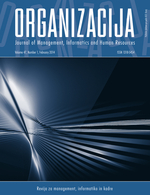Organisational Effectiveness and Customer Satisfaction
Abstract
This paper presents a test of the relationship between organizational culture as a crucial indicator of organizational effectiveness and customer satisfaction using service-unit data from two health resorts. Ensuring survival of the service organisation in the long run requires adaptations which are oriented towards achieving maximum customer satisfaction. This study intended to unveil the effect organisational factors have on customer service orientation from the customer and employee point of view within a two health resort service setting. The finding suggests that when trying to predict the comparative degree which organisational effectiveness factors have in satisfying customers’ needs, performance, adaptability and mission can be of the highest importance. Some effects like performance were uniform for employees and customers, while others varied depending on the organisation and the customer or employee group. Furthermore, findings suggest that service performance and organisation mission of the service organisation predict customer satisfaction based on established and proven health services. In this context there is no room for innovation, despite the fact that employees and customers do not share similar views about the impact of organisational effectiveness. Developing an effective service organisation can provide a competitive advantage to the organisation. Critical for the success of the service organisation is that organisational agents have a clear view of the existing organisation effectiveness and a clear view of the customer expectations in this area.
Refbacks
- There are currently no refbacks.

